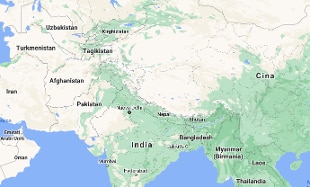Share
by Maria Novella Rossi
August 15, 2021 "The Taliban will not be wiped out, because they are deeply rooted in the foundation of society, so Beijing, Washington and Kabul have accepted the fact that we must include them in the peace and reconciliation process." This is what Li Shaoxian, a Chinese scholar and vice president of the Chinese Association for Middle East Studies, told the New York Times as early as 2016. On July 16, Chinese President Xi Jinping phoned President Ghani to talk about relations between the two countries. and a Taliban delegation arrived in the coastal city of Tianjin on the 31st of the same month. China has been present in Afghanistan for decades, dialoguing with the government in Kabul but at the same time with the Taliban, which according to some international observers it would train and finance. But today more than ever,China wants to carve out an increasingly important role as its interests in the Central Asian country grow.
The reasons are many: Afghanistan is a key country for the success of the New Silk Road: for some time Beijing has been aiming to rebuild the country's war-torn infrastructure by trying to include it in the BRI, the Belt and Road Initiave. Not only that: in recent months there have been rumors of a possible extension of the China / Pakistan corridor into Afghan territory.
The massive offensive, the blitzkrieg that brought Afghanistan back under the control of the Taliban has also renewed the urgency for Beijing to secure the borders with Xinjiang, the region inhabited by Muslim Uyghur Turks, 76 kilometers of border close with Badakhshan, the Afghan area already under the control of the Koranic students. A border with delicate balances that China shares with other 5 key countries such as Iran, Pakistan, Uzbekistan and Tajikistan. A region in which a new wave of radicalization of that Islamic extremism could be concentrated so fiercely opposed on Chinese soil with the repression of the Turkish Uyghur minority that has rained down on Beijing the criticisms of international public opinion for the lack of respect for human rights .
In light of all this, China has asked the Taliban for a public commitment to ensure that that territory cannot be used by terrorists (Uyghurs) as a base to carry out attacks inside China and to break ties with East Turkestan. Islamic Movement (Etym), which for Beijing foments separatism and fundamentalism in Xinjiang.
Finally, Afghanistan is an area rich not only in opium poppies, but also in gas, precious stones and above all rare earths, the precious minerals to produce technology as well as alternative energy. The worldwide demand for microchips, basic building blocks for smartphones and many technological devices has accelerated the demand for rare earths, the essential metals to produce them. The Chinese giant controls 80% of the world's rare earths, not only for the presence of large deposits in its territory, but also for the ability to extract these metals whose processing requires exhausting working hours and above all produces very high pollution not in in line with the environmental standards of the West.
A series of reasons that leave no doubt: Afghanistan must be pacified, China needs the stability of a key country for its rise in global power. A possible mediating action that would also be convenient for the USA. "China's positive involvement in the Afghan question could be a" good thing, "US Secretary of State Antony Blinken said two weeks ago.

